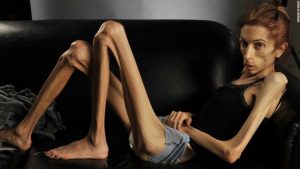Anorexia Nervosa: What Drives Someone With This Disease?
 Anorexia nervosa may not be categorized by a fear of gaining weight, but actually by the pleasure of losing it, says researchers. Additionally, the phenomenon may be influenced by genetics. The work challenges the notion of fear of gaining weight in anorexia patients.
Anorexia nervosa may not be categorized by a fear of gaining weight, but actually by the pleasure of losing it, says researchers. Additionally, the phenomenon may be influenced by genetics. The work challenges the notion of fear of gaining weight in anorexia patients.
The Study
In a study from Inserm, Paris Descartes University and Sainte Anne Hospital suggests anorexia nervosa may not be explained by a person being afraid of gaining weight, but being fueled by the pleasure of losing it. The information from the study was published in Translational Psychiatry, it was directed by Professor Gorwood, head of the Clinic for Mental and Brain Diseases.
Anorexia nervosa is often associated with major psychological stress and it’s an eating disorder which affects mostly girls and young women. A diagnosis of this eating disorder is based on three international criteria: caloric restriction, a distorted perception of weight and body and an intensive fear of becoming overweight.
Although there is no pharmaceutical treatment for anorexia, Professor Philip Gorwood’s team of researchers focused on these clinical criteria. As he explained, “When research is going nowhere, it is important to call into question the criteria at the very root of the disorder. We have therefore re-evaluated the last criterion, although it is quite prominent in patient discourse, by assuming that it is a mirror image of what is really involved, i.e. a reward for losing weight. We established the postulate that patients felt pleasure at becoming thin rather than fear of becoming fat.”
Anorexia nervosa is not influenced by patients’ discourse and analysis of their eating disorders, the team used a “skin conductance test, “which measures the patients sweating rate when exposed to various different images. The emotion caused by certain images actually leads the person to experience rapid and increased perspiration rates.
The team showed images of people of either normal weight or those who were overweight to 70 females consulting the Clinic for Mental and Brain Diseases in Sainte Anne Hospital. The women were of varying weights and had different severity levels of anorexia, viewing the images caused much the same reaction as it did with healthy subjects. Conversely, when viewing images of thin bodies, the women showed positively evaluated emotions, meanwhile healthy subjects didn’t have any particular reaction.
Anorexia is a highly heritable disorder and one of the genes associated with the disease codes BDNF, a factor that’s involved in neuron survival and neurophasticity. In people with anorexia nervosa, the study indicates that the increase in sweating experienced with looking at pictures of thin bodies is explained by the presence of a specific form of the gene in question. This result was confirmed after examining potential cofounding variables such as type of anorexia, weight or duration of the disorder.
Conclusion to the Study:
The conclusions of the study include:
•Support the genetic approach as a different way of addressing the key symptoms of anorexia nervosa.
•Gear research toward reward systems rather than phobic avoidance;
•Finally, they suggest certain therapeutic approaches, such as cognitive remediation and behavioral therapy, might have a clear beneficial effect on the disease.
 Eating Disorder Self Test. Take the EAT-26 self test to see if you might have eating disorder symptoms that might require professional evaluation. All answers are confidential.
Eating Disorder Self Test. Take the EAT-26 self test to see if you might have eating disorder symptoms that might require professional evaluation. All answers are confidential.